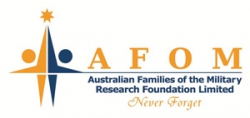Much is spoken of the ANZAC spirit and the possible apotheosis of the ANZAC legend. The concept is passionately debated, particularly in these modern times. Whatever views you may hold on this subject, it is indelibly mixed with our Australian spirit and psyche; that is a deep pride, which is more often felt than spoken. The Australian spirit has a sense of teamwork, mateship and altruism that includes generosity and the ability to collaborate and get things done. It is different to overt nationalism expressed in other countries.
Throughout our history of engaging in wars and conflicts Australian families of the military have had a collective self-understanding that has been refashioned again and again. This combined with the Australian spirit and the ANZAC legend, I believe, readily reflects the enduring qualities of the families of the Australian military (the AFOM ethos). It is said; nowhere is pain felt more intensely than among the families of those killed at war, though the grief and loss may be displayed differently. However, much pain is also felt by the families of those who return with physical and emotional wounds. It is a lived experience that can build resilience and strength, or tear lives and families apart, and all the degrees between.
While Australians are mainly collaborative rather than individualistic, such lived experiences can leave people and families feeling alone and desolate. Yet a healthy family environment is necessary for the recovery of our wounded service men and women.
Despite the gains made over the years to assist and support such families, the system is not working effectively. Indeed, it can work in ways that are the antithesis to the very ANZAC and Australian spirit it claims to reflect. Sometimes it can be dauntingly adversarial and at other times more token than substantial. This, for some, is the final straw. There is much that must be done to remedy these failures, for, as I have said, without a healthy family environment, there can be limited or no recovery of those damaged by their service.
Guarding the Home Front is not just a reflection of what families endured while their loved ones were away, but how they managed and are trying to manage today when they return. The battles continue for many of the families while they are still ‘guarding the home front’.
Gail MacDonell OAM
President, Australian Families of the Military Research & Support Foundation Ltd.




